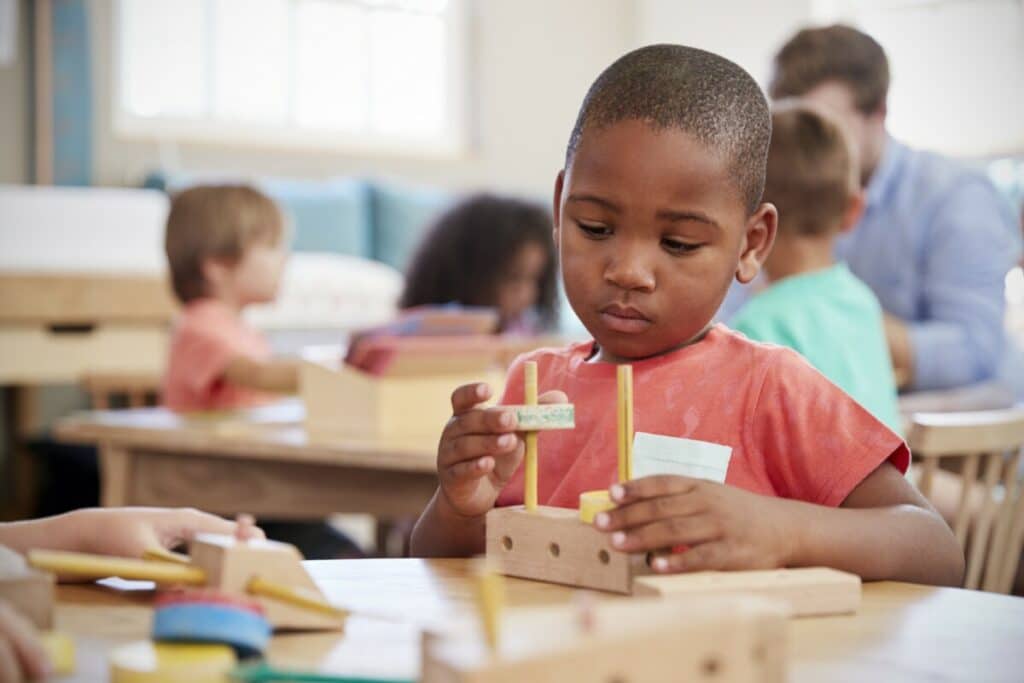Why Montessori Schools Don’t Allow Pretend Play
Montessori schools are gaining a lot of media attention, and their teaching styles are being adopted by a lot of private schools across the country. This style of developmental teaching has intrigued parents, but the number one concern mentioned is that Montessori schools do not support or encourage pretend play activities. I listened to different Montessori practitioners’ explanations for why they do not encourage make-believe activities to explain to concerned parents.
Montessori schools do not encourage make-believe activities and pretend play because children have a hard time knowing the difference between reality and make-believe. Montessori schools believe it is better to give children opportunities to perform real-world activities so they can grow real-world skills.
Montessori educators do not discourage imagination or creativity. Instead, they promote their students to use their imagination and creativity in productive ways that help them to grow as an individual. Read on to learn how Montessori promotes creativity and imagination in productive ways.
Montessori Make Believe Philosophy
Montessori’s philosophy does not encourage make-believe activity, or “pretend play”. Many people who research child development are shocked and horrified by this fact. Make-believe encourages the imagination which is especially large during early childhood. Encouraging the imagination grows creativity and intelligence. Make-believe is a popular imagination tool in the U.S.
Montessori schools are aware that imagination is important. They do not want to diminish the imagination. Instead, they want to channel it toward other activities. They argue that the regular imagination growth activity of make-believe actually causes confusion and does not stimulate development as productively as it could.
Montessori teachers argue that make-believe gives children false ideas about reality. They believe that make-believe encourages the monster in the closet and teaches children that quicksand is a much bigger problem than it really is. Promoting exploration of imagination in terms of exploring real-world activities will stimulate a desire to do research in the real world.
Montessori philosophers state that because the child is so young, the entire world seems fantastical. They do not need fairies or dragons. What they need is an introduction to the magical functions of the world. This is a prime time to introduce them to life skills that will help them when they get older.
Child Developmental Stages

Montessori researchers believe that there are four major developmental phases in a child’s growth. The educational process is split to cater to each of these developmental phases to help your child reach peak performance for adulthood.
The first developmental phase is from the age of toddlers to 6 years of age. This is when children are sponges. They are ready to learn, and they desire to be physically independent. During this phase, letting the child learn how to live out their fantasies in a real-world environment will help them grow their independence.
The second developmental phase is from the age of 6 to 12. This is when the child is learning mental independence. They are learning to come up with their own thoughts and grasp complex concepts. This is a great time to let the children use their imagination to gain an understanding of culture and society. They will be more interested in creative constructs like art and reading.
The third developmental phase is from the age of 12 to 18. In this phase, children want to learn their place in the world. They are striving to gain more control in their life. This is a great time to use their imagination to expand their control on their current reality and figure out how they are going to be a contributing member of society.
The fourth and final developmental phase is 18 to 24 years of age. This is when they are ready to take charge of their own lives and have a love of learning. In this stage, imagination can be used to inspire new topics of discovery to help them progress in their career and projects.
Activities that Encourage Growth
Teachers of the Montessori principle do not discourage the use of the imagination. Instead, they encourage the option to grow life skills using imagination.
A Montessori teacher is not going to slap the play food out of your child’s hand. Instead, they are going to offer them access to a child-sized kitchen where they can make their own real food. They will teach them how to use child safety knives and ask for access to using a child-sized stove where they can grow their independence.
These are actual activities that are performed in Montessori schools. Children are encouraged to learn from their fantasies. There is no reason why a child should not be allowed to live their make-believe in real life with adult supervision, and that is what Montessori teachers are there for.
Children in Montessori schools are given child-sized real brooms instead of fake brooms. They are taught to care for others by caring for the other children in the classroom. They are allowed to play builder by creating actual projects that can be taken home such as building a bird feeder or making clay mugs.
By encouraging using the imagination as a tool to actually accomplish something, children are gaining more skills to be independent, which is something that children of all ages of development crave.
Montessori Materials

Montessori children are given the opportunity to play with real items that are built to their size. They are given real cleaning supplies and real kitchens. They are also given toys (materials) that are made with real-world materials. These are wood, metal, and natural fabrics. Montessori children are not given toys that are made out of plastic. This allows children to explore and become familiar with the natural materials of the world.
All the toys are based on reality. They can be building blocks that help children learn basic hand motor skills. They could be puzzles that allow children to use problem-solving skills.
Montessori schools usually have a lower amount of toys. Having too many toys leaves children overwhelmed and frustrated. Also, the toys tend to be simple. Overcomplicated toys with lots of pieces do not stimulate creativity. Instead it just makes chaos.

